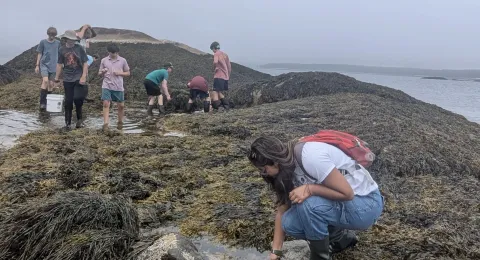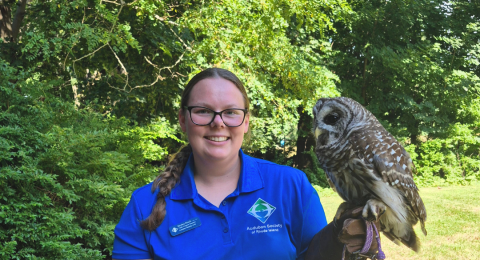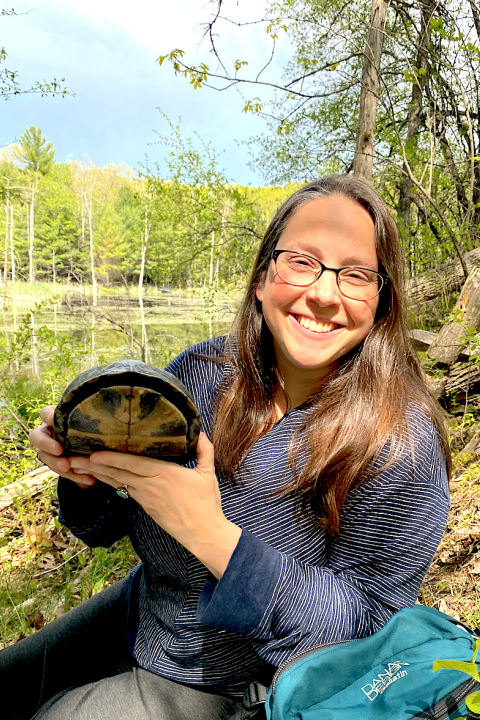About the Wildlife and Conservation major at UNH
The Wildlife and Conservation Biology major at UNH is an in-depth exploration of biodiversity and the strategies needed to protect ecosystems. This major provides hands-on experience in field research, wildlife management and conservation planning, preparing you to tackle environmental challenges and protect endangered species. It appeals to those who are passionate about nature, enjoy outdoor work and have a strong interest in ecology and conservation. It is ideal for students who are curious about the natural world and motivated to make a positive impact on the environment.
What is wildlife and conservation biology?
The Wildlife and Conservation Biology program provides students with the multi-disciplinary background necessary to manage and conserve wildlife and their habitats against the backdrop of human population growth, development and climate change. Students in this degree program develop a broad foundation in the natural sciences and learn to manage a wide range of species.
Why study wildlife and conservation biology at UNH?
Located in the wildlife-rich state of New Hampshire, just minutes from the Atlantic Coast and an hour from the White Mountains, UNH is the perfect place for studying wildlife and conservation biology. Our program emphasizes hands-on experience through intensive lab and fieldwork, and students are encouraged to participate in faculty research projects involving a variety of wildlife species in areas including big game management, conservation biology, conservation genetics, endangered species management, landscape ecology and population ecology.
Potential careers
- Conservation
- Environmental education
- Game management
- Public outreach
- Resource management
- Wildlife management
Curriculum & Requirements
The Wildlife & Conservation Biology major provides students with the knowledge and tools to study, conserve, and manage wildlife and their habitats.
Our students combine science with their passion for nature and the outdoors. Our courses emphasize hands-on experience and place fundamental principles within an applied context. Students are encouraged to conduct research alongside faculty, and faculty actively assist students in obtaining internships.
Our students become wildlife biologists and resource managers at state/federal agencies and non-profit organizations, conservation law officers, and environmental educators. Many go on to obtain an advanced degree.
Sample Degree Plan
This sample degree plan serves as a general guide; students collaborate with their academic advisor to develop a personalized degree plan to meet their academic goals and program requirements.
| First Year | ||
|---|---|---|
| Fall | Credits | |
| NR 433 | Wildlife Ecology | 4 |
| NR 425 | Field Dendrology | 4 |
| BIOL 411 | Introductory Biology: Molecular and Cellular | 4 |
| ENGL 401 | First-Year Writing | 4 |
| Credits | 16 | |
| Spring | ||
| MATH 424B | Calculus for Life Sciences | 4 |
| BIOL 412 | Introductory Biology: Evolution, Biodiversity and Ecology | 4 |
| NR 411 | Environmental and Resource Economics Perspectives | 4 |
| Discovery Elective | 4 | |
| Credits | 16 | |
| Second Year | ||
| Fall | ||
| NR 415 | Natural Resources Field Methods | 2 |
| NR 527 | Forest Ecology | 4 |
| CHEM 411 | Introductory Chemistry for Life Sciences | 4 |
| ZOOL 613W | Animal Behavior | 5 |
| Credits | 15 | |
| Spring | ||
| NR 417 | Sophomore Seminar: Wildlife and Conservation Biology | 2 |
| NR 658 | Introduction to Geographic Information Systems | 4 |
| BIOL 528 | Applied Biostatistics I | 4 |
| Discovery Elective | 4 | |
| Animal Morphology, Evolution and Ecology Elective | 4 | |
| Credits | 18 | |
| Third Year | ||
| Fall | ||
| NR 615 | Wildlife Habitats | 4 |
| ENGL 501 | Introduction to Creative Nonfiction | 4 |
| ZOOL 690 or ZOOL 690W | Evolution or Evolution | 4 |
| Discovery Elective | 4 | |
| Credits | 16 | |
| Spring | ||
| NR 602 | Natural Resources and Environmental Policy | 4 |
| NR 650 | Principles of Conservation Biology | 4 |
| Discovery Elective | 4 | |
| Elective | 4 | |
| Credits | 16 | |
| Fourth Year | ||
| Fall | ||
| NR 642 | Introduction to Biogeography | 4 |
| NR 740 | Inventory and Monitoring of Ecological Communities | 4 |
| Elective | 4 | |
| Elective | 4 | |
| Credits | 16 | |
| Spring | ||
| NR 640 | Wildlife Population Ecology | 4 |
| NR 750 | Sustaining Biological Diversity | 4 |
| Elective | 4 | |
| Animal Morphology, Evolution and Ecology Elective | 4 | |
| Credits | 16 | |
| Total Credits | 129 | |
Degree Requirements
All Major, Option and Elective Requirements as indicated.
*Major GPA requirements as indicated.
Major Requirements
In addition to the Wildlife and Conservation Biology degree requirements (below), students must complete the University Discovery Program and the University Writing Requirements. Given the flexibility of this major, students may also complete a minor or dual major in a second area of interest, or apply for certification by The Wildlife Society.
| Code | Title | Credits |
|---|---|---|
| Required Courses | ||
| NR 433 | Wildlife Ecology | 4 |
| BIOL 411 | Introductory Biology: Molecular and Cellular | 4 |
| BIOL 412 | Introductory Biology: Evolution, Biodiversity and Ecology | 4 |
| NR 411 | Environmental and Resource Economics Perspectives | 4 |
| NR 425 | Field Dendrology | 4 |
| Math Foundations | ||
| MATH 424B | Calculus for Life Sciences | 4 |
| or MATH 420 | Finite Mathematics | |
| Chemistry Foundations | ||
| CHEM 411 | Introductory Chemistry for Life Sciences | 4 |
| or CHEM 403 | General Chemistry I | |
| Introductory Ecology | ||
| NR 527 | Forest Ecology | 4 |
| or BIOL 541W | Ecology | |
| NR 415 | Natural Resources Field Methods 1 | 2 |
| NR 417 | Sophomore Seminar: Wildlife and Conservation Biology 1 | 2 |
| BIOL 528 | Applied Biostatistics I | 4 |
| Animal Morphology, Evolution, and Ecology | ||
| Select two courses from the following: | 8 | |
NR 506 | Forest Entomology | |
or ZOOL 555 | Introduction to Entomology | |
NR 712 | Mammalogy | |
or MEFB 535 | Marine Mammal Biology | |
ZOOL 518 | Comparative Morphology and Biology of Vertebrates | |
ZOOL 542 | Ornithology | |
or MEFB 510 | Field Ornithology | |
ZOOL 566 | Herpetology | |
ZOOL 710 | Sharks and Bony Fishes | |
or MEFB 741 | Sharks: Biology and Conservation | |
| Communications Skills | ||
| NR 508 | Communicating Science | 4 |
| or ENGL 501 | Introduction to Creative Nonfiction | |
| or ENGL 502 | Professional and Technical Writing | |
| or ENGL 503 | Persuasive Writing | |
| or CMN 500 | Public Speaking | |
| Evolution/Genetics | ||
| NR 664 | Conservation Genetics and Applied Evolution | 4 |
| or ZOOL 690 | Evolution | |
| or ZOOL 690W | Evolution | |
| Physiology/Behavior | ||
| ZOOL 625 | Principles of Animal Physiology | 3-5 |
| or ZOOL 613W | Animal Behavior | |
| or ZOOL 726 | Conservation Behavior | |
| Policy | ||
| NR 602 | Natural Resources and Environmental Policy | 3-4 |
| or MARI 705 | Introduction to Marine Policy: Understanding US Ocean, Coastal and Great Lakes Policy | |
| or POLT 500 | American Public Policy | |
| NR 615 | Wildlife Habitats | 4 |
| NR 650 | Principles of Conservation Biology | 4 |
| Geographic Information Systems | ||
| NR 658 | Introduction to Geographic Information Systems | 4 |
| or ESCI 777 | GIS for Earth & Environmental Sciences | |
| NR 640 | Wildlife Population Ecology | 4 |
| Advanced Ecology Elective | ||
| NR 641 | Wildlife Disease Ecology | 4 |
| or NR 642 | Introduction to Biogeography | |
| or NR 713 | Quantitative Ecology | |
| or NR 729 | Silviculture | |
| or NR 730 | Terrestrial Ecosystems | |
| or NR 734 | Tropical Ecology | |
| or NR 751 | Aquatic Ecosystems | |
| or NR 765 | Community Ecology | |
| or BIOL 720 | Plant-Animal Interactions | |
| or MEFB 717 | Lake Ecology | |
| or ZOOL 708 | Stream Ecology | |
| NR 740 | Inventory and Monitoring of Ecological Communities | 4 |
| Capstone | ||
| NR 750 | Sustaining Biological Diversity 2 | 4 |
| Total Credits | 90-93 | |
- 1
NR 415 Natural Resources Field Methods & NR 417 Sophomore Seminar: Wildlife and Conservation Biology are 2-credit courses. Students should meet with their advisor for guidance on course load (e.g., 14-15 or 18 cr.) that best accommodate these courses while meeting the 128-credit which requires 32 credits per year (on average).
- 2
Capstone can also be met with NR 663 Applied Directed Research in New Zealand UNH EcoQuest (or similar, approved experience) if taken as a senior, in the final year. An Honors Thesis/UROP/URA/SURF/Independent Study (or similar) cannot count as a Capstone for this major.
Program Learning Outcomes
Students will:
- Understand the ecological and societal value of biodiversity, sustainability, and environmental stewardship;
- learn/understand ecological concepts and fundamental principles and techniques to manage and conserve wildlife habitat and populations;
- know the taxonomy, ecology, and natural history of the majority of native flora and fauna in New England;
- locate, evaluate, and summarize information from both print and electronic media relevant to wildlife and conservation biology issues;
- effectively communicate scientific information in written and oral formats;
- master mathematical, statistical, and study design knowledge and skills, and use state-of-the-art software, hardware, and analytical techniques relevant to wildlife and conservation biology;
- be familiar with a variety of natural resource laws and regulations;
- understand how to integrate relevant social sciences and human dimensions approaches to address wildlife and conservation biology issues as part of multidisciplinary teams.
Explore Program Details
Key Learning Objectives:
Students will:
- Understand the ecological and societal value of biodiversity, sustainability, and environmental stewardship, and more specifically, learn/understand ecological concepts and fundamental principles and techniques to manage and conserve wildlife habitat and populations;
- know the taxonomy, ecology, and natural history of the majority of native flora and fauna in New England;
- locate, evaluate, and summarize information from both print and electronic media relevant to wildlife and conservation biology issues, and effectively communicate scientific information in written and oral formats;
- master mathematical, statistical, and study design knowledge and skills, and use state-of-the-art software, hardware, and analytical techniques relevant to wildlife and conservation biology;
- be familiar with a variety of natural resource laws and regulations and understand how to integrate relevant social sciences and human dimensions approaches to address wildlife and conservation biology issues as part of multidisciplinary teams.
The WCB program provides students with a multi-disciplinary curriculum, rooted in ecological studies, to prepare them to manage and conserve wildlife populations and their habitats. The WCB curriculum enables students to combine science with a passion for nature and the outdoors.
Students who are interested in the environment and animal populations and have a love for nature and the outdoors will thrive in the WCB program.
The WCB curriculum has a strong applied focus on natural resource management and wildlife conservation. Students are challenged to apply fundamental principles and field and analytical techniques to real-world studies on the conservation and management of animal populations and their habitats. The program provides extensive hands-on training in field techniques and develops connections with wildlife professionals and stakeholder partners in the region. Overall, the program provides more field and outdoor experiences than other majors in the college.
The WCB degree prepares students for a diversity of careers focused on ecology and natural resource management and conservation, including wildlife biologist, conservation biologist, park service ranger, conservation officer, environmental educator, environmental consultant, research scientist or academic researcher.
Our recent WCB graduates have taken jobs at local and regional state and federal agencies, as well as NGOs and private consulting companies, including the US Fish & Wildlife Service and associated National Wildlife Refuges, New Hampshire Fish & Game or other state fish and game departments, USDA Aphis, USDA Plant and Animal Inspection Service, Stantec Consulting, Normandeau Associates, local land trusts (e.g. Bear Paw Regional Greenways), and University Cooperative Extension programs. Our students also enter highly ranked graduate programs throughout the country.
Yes, the WCB degree prepares students well to continue their education with graduate studies in ecological fields, including Natural Resources, Environmental Science, Ecology and Evolution, Wildlife Biology, Conservation Biology, and Forest and Conservation Sciences.
Most WCB courses have an associated laboratory or recitation. Labs are often field-based, providing students opportunities to learn outdoors in the University’s surrounding woodland properties, farms, and coastal and estuarine research centers. Local and regional field trips are also components of several courses, exposing students to diverse habitat, ecosystems, field techniques, and management and conservation activities. Many of these field trips engage participation by wildlife professionals, including UNH alumni, and thereby provide opportunities for students to experience real-world projects with stakeholder partners. Some courses provide computer lab experiences, through the department’s dedicated computer cluster and mobile laptop resources.
The WCB major includes a dedicated capstone course, NR 750 Sustaining Biological Diversity, as a culmination of the curriculum. This course integrates learning experiences across the 4 years with a semester-long group project, it also focuses on communication and professionalism. Field trips with wildlife professionals highlight careers and opportunities to prepare students for a range of professions in wildlife and conservation biology.
Class size varies depending on the level of the course and whether it is specific to the WCB major or a common requirement for other majors in the college. In general, class size reduces as a student progresses to higher-level courses specific to the major. Introductory level core courses, such as Chemistry, Biology, Math and Wildlife Ecology, tend to be larger lectures (100-200 students), with lab sections capped at 24 students; most other core courses have enrollments <50. Upper-level courses specific to the WCB major have class sizes of 20-25.
The WCB curriculum grants ~94 credits of the 128 credits required for a Bachelor’s degree at UNH. This consists of 25 WCB specific requirements and includes 6 of 11 Discovery requirements that are met with required WCB courses; another 1-2 Discovery requirements can be met with course selection within the major.
Yes, there are ~34 open credits after students fulfill the WCB requirements. These include a few remaining Discovery requirements; the rest can be filled by electives of the student’s choice. This leaves room for a minor, see below.
Many WCB students pursue a minor in a related field, e.g., Animal Behavior, Forestry, Geospatial Analysis, and Wetland Ecology are popular minors. With careful planning, students may also pursue a dual major, outside of the College of Life Sciences and Agriculture, e.g., in a foreign language. Justice Studies and Sustainability are two popular dual majors that interface with the WCB major.
A large proportion of our students pursue internship opportunities, especially in the summer, with state agencies, state and national parks, or local conservation organizations.
Yes, students are encouraged to pursue undergraduate research opportunities, with faculty within or outside of the WCB major. All WCB faculty provide undergraduate research opportunities. Funding is available through the Hamel Center for Undergraduate Research.
The Ecoquest New Zealand program is specifically tailored with a curriculum in ecological field studies, relevant to students in WCB and related majors. These opportunities can be pursued in either an academic semester or the summer. Hundreds of additional approved international study abroad opportunities are available; more information can be found at the UNH Study Abroad Office.
Yes, WCB students are assigned a faculty advisor in their freshman year. This advisor is a faculty member who teaches in the WCB program and will remain the student’s advisor through graduation. Advisors meet with their students at least once per semester to help them select and register for classes, consult about internship and research opportunities and career advice and are available by appointment to help students with their academic questions throughout the year
Rigorous academic pursuit and hands-on learning from the mountains to the sea. Full immersion learning at a diversity of sites in the North and South Islands.
Xi Sigma Pi is facilitated through the UNH NREN department. Its goal is to unite likeminded individuals through service and fraternal spirit through a shared enjoyment of the environment. In addition, members receive recognition for their service by earning a cord to wear during graduation. Opportunities to take up leadership roles and give back to the NREN department are abundant.
Students interested in the Wildlife and Conservation Biology major may also be interested in the following advanced degrees at UNH. Students in the program also have the opportunity to participate in the UNH accelerated master’s program.
Integrative Biology M.S.
Integrative Biology Ph.D.
Marine Biology M.S.
Marine Biology Ph.D.
Natural Resources and the Environment M.S.
Natural Resources: Ecosystem Science M.S.
Natural Resources: Environmental Conservation and Sustainability M.S.
Natural Resources: Environmental Economics M.S.
Natural Resources: Forestry M.S.
Natural Resources: Wildlife and Conservation Biology M.S.
Ecological Genomics Graduate Certificate
Geospatial Science Graduate Certificate


















